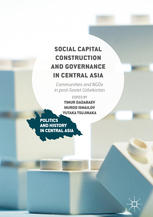

Most ebook files are in PDF format, so you can easily read them using various software such as Foxit Reader or directly on the Google Chrome browser.
Some ebook files are released by publishers in other formats such as .awz, .mobi, .epub, .fb2, etc. You may need to install specific software to read these formats on mobile/PC, such as Calibre.
Please read the tutorial at this link. https://ebooknice.com/page/post?id=faq
We offer FREE conversion to the popular formats you request; however, this may take some time. Therefore, right after payment, please email us, and we will try to provide the service as quickly as possible.
For some exceptional file formats or broken links (if any), please refrain from opening any disputes. Instead, email us first, and we will try to assist within a maximum of 6 hours.
EbookNice Team

Status:
Available0.0
0 reviewsThis cutting edge collection focuses on the nature of civil society and its role in facilitating governance in Central Asia, considering local implications related to the concept of social capital and civil society in the Uzbek context. It discusses the complexity of the notion of social capital in post-Soviet Uzbekistan, detailing the challenges and pressures facing the Uzbek people. Challenging prevailing views on post-Soviet political transitions, the book demonstrates that successful transition to democracy and rule of law cannot be accomplished unless the concerns, fears, frustrations and local understandings of the desired political system are heard, registered and carefully interpreted. Offering a comparative study of civil society and social capital in Asia, this collection is a key read not only for scholars and students in civil governance and post-soviet transitions, but also aid agencies, foreign governments, and international organisations working with civil society groups.